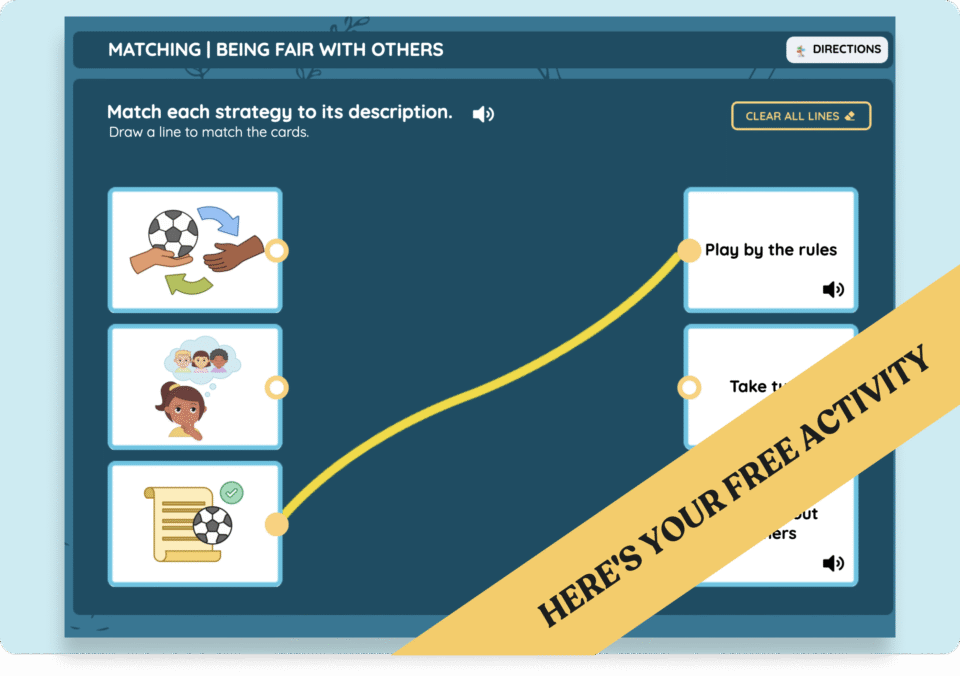The Importance of Setting Boundaries
Get free social skills materials
No-prep lessons on self-regulation, emotional recognition, conversation skills, and more.
Sign up hereGuest post by Laurel Mendoza, MA, CCC-SLP, in partnership with eLuma Online Therapy.
A boundary is a limit you place on the behaviors of both yourself and other people. It is the way you communicate what is and isn’t acceptable, or how others should and shouldn’t treat you. Are you good at setting boundaries to protect your mental health and wellbeing?
What do you do when your work hours end? How many of us actually shut off the computer or put away the papers and walk away? How many of us have said “yes” to things asked of us so that we might be perceived as capable, dependable, and hard-working – only to end up feeling exhausted, not in control, and overwhelmed? How many of us want to say no but do something anyway so as not to offend or inconvenience a friend or family member?
Give them an inch, they swim all over you.
– Sebastian, The Little Mermaid
As educators and therapists, we know stress and hard work are part of the job, but it is imperative that we learn where to draw the line between working hard and overworking.
This recent article about teacher overtime from We Are Teachers has been circulating around the internet of late. The article, entitled “It’s Time To Stop Wearing Teacher Overtime as a Badge of Honor,” refers to the concept of “toxic productivity” and how working ourselves to the point of exhaustion should not be a badge of honor. Somewhere along the way, it has been drilled into us that waking up early, working all day, and then working late into the night means we are dedicated, motivated, and all in all, a prime example of someone to be admired for their work ethic.
Daring to set boundaries is about having the courage to love ourselves, even when we risk disappointing others. We can’t base our own worthiness on others’ approval. Only when we believe, deep down, that we are enough can we say, enough!
– Brené Brown
However, not defining clear boundaries and expectations is actually a disservice to both ourselves and others. In the absence of these conversations, we may feel dismissed, not respected, or unheard. In the work environment, this can often lead to burnout.
The idea of setting boundaries may sound daunting, so here are some ideas to start:
10 tips for setting boundaries
- Know your emotional, physical, mental, and spiritual limits.
- Communicate expectations clearly and consistently.
- Accept that not everyone will respect your boundaries. Know that you can’t please everybody and that’s okay.
- Focus on the things you can control.
- Examples: Remove work email and messaging from your phone, only check your email at designated times of the day, and close your laptop and leave it at your desk before moving on with your evening.
- Avoid comparing yourself to others; everyone’s situation is different.
- Ask for help when you need it.
- Take time off – when you get it, when you need it, and when it’s offered.
- Learn to say no. No is a complete sentence.
- Set time limitations.
- Examples: Do not respond to work related communications after a designated time, take advantage of technology (set automatic timers to turn off your Wifi at a certain time; use applications that time you out of specific programs at the end of the day), or block out specific hours of the week set aside for specific work/projects.
- Remind yourself that by setting boundaries, you’re honoring your needs.
Download a printable version of these tips!
Setting boundaries is an integral part of self-care. It can look like turning down a new project when you don’t have the time, not answering a phone call or email after hours, or saying no to taking on more clients than you can effectively serve. Open dialogue encourages us to be our authentic selves, which ultimately results in increased productivity and improved morale.
While we may not always be able to decide the outcome, boundaries should always be part of the conversation.
I used to have to do a lot of searching, printing, and making materials. Now, I know I can go to Everyday Speech and have ready to go lessons. It saves me an enormous amount of time. The games really keep my students engaged and they have made so much progress. They have learned what to expect as well because the language is so consistent and clear.
– Melissa C., MCD, CCC-SLP

